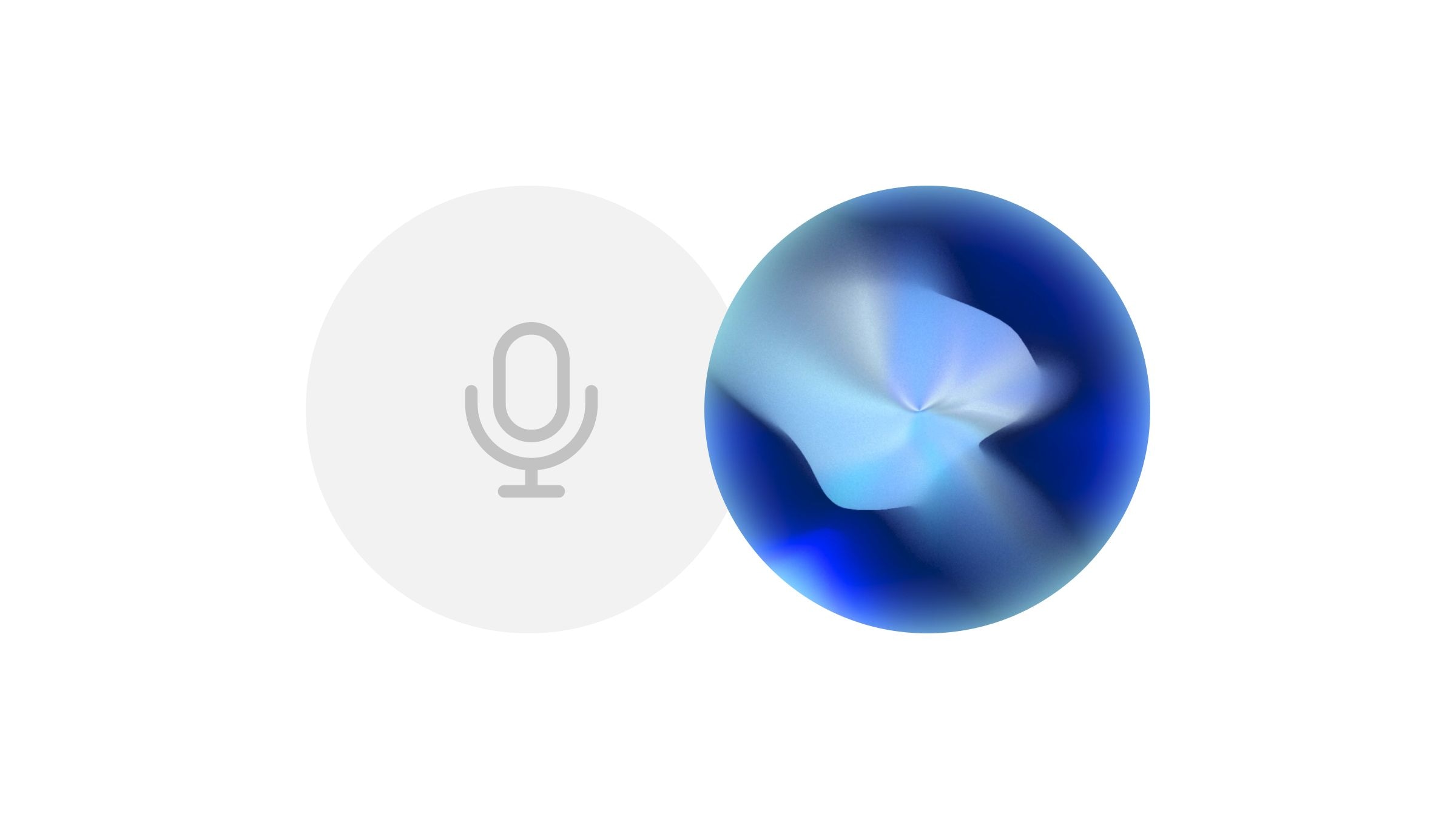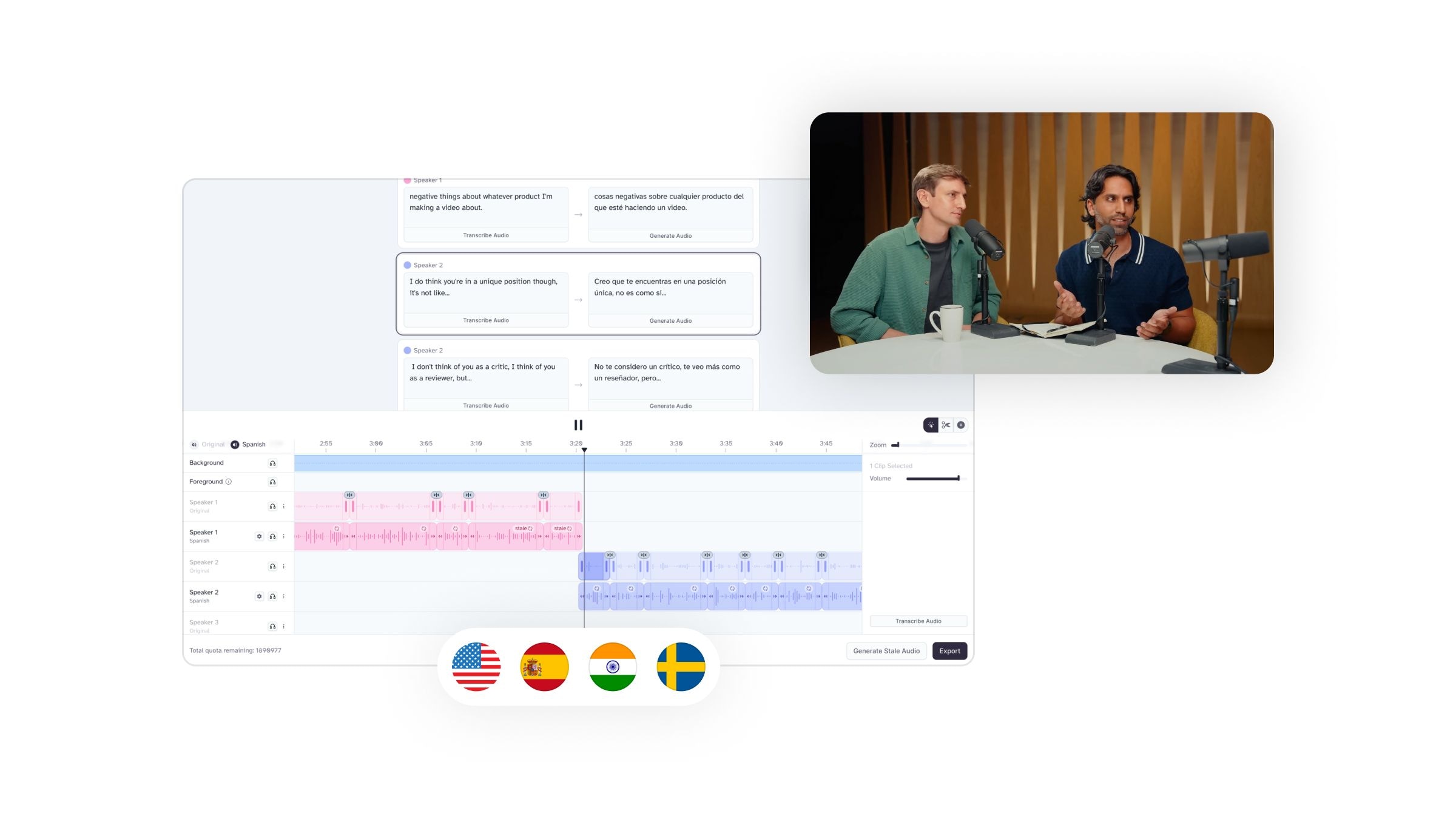
Automate video voiceovers, ad reads, podcasts, and more, in your own voice
Introducing Eleven v3 (alpha)
Try v3AI can transform the way you bring stories to life on screen
Artificial Intelligence is stepping into the spotlight in future dubbing for TV and film. In an industry known for its innovative storytelling, AI dubbing is making its mark, offering a faster, more cost-effective, and incredibly versatile solution for voiceover work.
With us here at ElevenLabs, you can get the most advanced text-to-speech and voice cloning software available thanks to generative voice AI technology.
Does this sound overwhelming? That's totally understandable, but you've come to the right place. In this in-depth guide, we're going to walk you through the ins and outs of AI dubbing.
Whether you're a seasoned filmmaker looking to streamline your production process or a content creator eager to explore new possibilities, we've got you covered.
This isn't science fiction. It's about the real, practical applications of generative voice AI that can transform the way you bring stories to life on screen. So, it's time to learn the ropes and see how AI dubbing for film and TV opens up new possibilities for you.

Before we delve deep into AI dubbing, let's take a moment to rewind and examine the history of dubbing in the world of film and TV.
The roots of dubbing can be traced back to the early days of cinema. As silent films transitioned to “talkies” in the late 1920s, the need for dubbing became apparent. Films produced in one language needed to reach global audiences, and dubbing emerged as the solution.
This practice allowed viewers worldwide to enjoy cinematic experiences in their native tongues, breaking down language barriers and expanding the reach of the medium.
In the early days, dubbing involved simple methods like live voiceovers or re-recording dialogue. However, as technology advanced, so did dubbing techniques.
The introduction of lip-syncing and more sophisticated sound recording methods in the mid-20th century marked a significant step forward. Dubbing became an art form, as talented voice actors worked tirelessly to match the lip movements and emotions of the original performances.
Human voice actors have long been the unsung heroes of traditional dubbing. They breathed life into characters, preserving the essence of the original performances while adapting them to suit the cultural nuances and preferences of different audiences.
These skilled professionals crafted seamless vocal performances, ensuring that viewers could connect with the characters on screen, no matter where they were watching.
While traditional dubbing has served the industry well for decades, it's not without its challenges. The process is often time-consuming and expensive, requiring the hiring of voice actors, studio space, and post-production synchronization efforts.
Moreover, finding the perfect voice match for a character can be challenging, leading to compromises in the quality of the dub.
As we look back at the history of dubbing, it's clear that the industry has come a long way. Yet, the arrival of AI dubbing promises to bring a new level of efficiency and versatility to the world of film and TV dubbing.
Let's explore how this modern technology is shaping the future of storytelling on screen.

Time is often of the essence when it comes to film and TV, so the emergence of AI-driven dubbing solutions has brought a welcome wave of innovation. AI has quietly but significantly transformed the way we approach the intricate art of dubbing.
AI-driven dubbing solutions represent a paradigm shift in the industry. These technologies have swiftly risen to prominence, offering a compelling alternative to traditional dubbing methods. What sets them apart is their ability to automate and streamline the dubbing process.
The magic behind AI dubbing lies in advancements in natural language processing (NLP) and voice synthesis. NLP enables machines to understand and interpret human language with remarkable accuracy. When combined with sophisticated voice synthesis algorithms, AI can generate remarkably lifelike vocal performances that closely mimic human speech patterns and emotions.
So, how has AI improved the dubbing process? Firstly, it's all about speed. AI can churn out voiceovers in a fraction of the time it would take for traditional methods. This efficiency not only accelerates production schedules but also reduces costs.
Moreover, AI doesn't suffer from the limitations of human voice actors. It offers a treasure trove of diverse voices, accents, and emotions, enabling creators to find the perfect match for their characters. Customization is at the core of AI dubbing, allowing for adjustments in pitch, tone, and style to suit the unique requirements of each project.

Now, let's dive into the core of the matter - how ElevenLabs is redefining AI dubbing in the film and television industry.
ElevenLabs is not your average AI dubbing tool. Powered by cutting-edge AI technology, our software brings a wealth of capabilities to the table. Benefits include:
Let's get practical. How does ElevenLabs fit into the real-world landscape of film and TV dubbing? Here are some applications:

Automate video voiceovers, ad reads, podcasts, and more, in your own voice
Finally, ElevenLabs places a strong emphasis on ethical practices and responsible AI usage. For example, in voice cloning, explicit consent from the individual whose voice is being cloned is a fundamental requirement.
Additionally, we have implemented robust safeguards to prevent any potential misuse of its technology, ensuring that it is used ethically and responsibly in all applications.
A journey through the world of AI dubbing has been nothing short of eye-opening. We've explored the rich history of dubbing, the emergence of AI in the industry, and the incredible potential it holds for filmmakers and content creators.
From the early days of silent films to the present, storytelling has always been at the heart of cinema and television. AI dubbing is not a replacement for human skills but a remarkable tool that empowers creators to elevate their craft.
ElevenLabs is the driving force that unlocks cinematic potential like never before. With its advanced text-to-speech and voice cloning capabilities, it's a game-changer that accelerates production, reduces costs, and enhances customization. It's a tool that respects and complements human talent, ensuring that your stories reach wider and more diverse audiences.
Sign up today for free and explore our vast voice library, fine-tune voices, and experience seamless multilingual support. With ElevenLabs, you're embracing the limitless possibilities of storytelling.
The cinematic world is waiting for your voice, and ElevenLabs is here to make it heard.

Translate audio and video while preserving the emotion, timing, tone and unique characteristics of each speaker

Learn how ElevenLabs and Cartesia compare based on features, price, voice quality and more.

Unlocking the Power of AI Voiceovers for eLearning